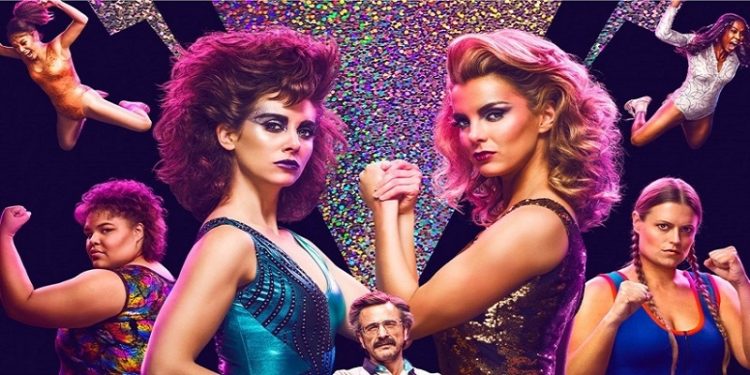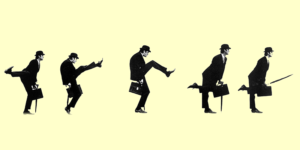GLOW, Long-form jokes, and Storytelling Payoffs

If I had to pick the show that surprised me most in 2017, it would be GLOW on Netflix. It’s a half-hour comedy drama that tells the liberally embellished story of the Gorgeous Ladies of Wrestling. Gorgeous Ladies of Wrestling was a wrestling promotion/television show in that began in the mid-80’s and continued off-air through the 90’s, where it languished. In the early 2000’s, it was revived and has seen fair success through special attractions and cross-media promotion – a 2012 documentary on it is both award-winning and excellent. Anyway, the Netflix show does something I absolutely adore – tell a long form joke that also manages to play a significant part in character arcs and the overall story. Coincidentally, managing to pull something like this off is one of the better lessons to examine if you want to run a tabletop game. So, let’s talk about GLOW, long-form jokes, and storytelling payoffs.
Subversia
Now, I’ve written about the structure of some good jokes that subvert expectations in the past. On the surface, this joke is a classic bait and switch. It presents one thing throughout its duration, only to change the subject of the joke at the conclusion. Thanks to the miracle of episodic television, we see this joke progress across three hours of story advancement – spanning episodes three through six. The joke does manage to subvert expectations, but it’s more than that. It’s not quite the same as a joke told with a different punchline that highlights a different joke entirely like the tuck joke in Popstar: Never Stop Never Stopping. While that joke highlights the gonzo world of entertainment and entertainment media, it only serves as a capstone to the commentary on Hunter the Hungry rather than being an arc catalyst for Connor.
What makes this joke really a homerun is the firm understanding of Marc Maron’s character, Sam Sylvia. For a lot of people, Marc Maron is a polarizing comedian. I’m not here to comment about that one way or the other. Instead, let me just say that his portrayal of a sleazy exploitation film director Sam Sylvia is superb. Sam Sylvia is the type of person who believes they are creating challenging, deep, meaningful art, but can’t quite understand the disconnect between what’s in his head and how is audience is perceiving his work.
What he attributes to genre or allegory, others see as simple hack work. He believes he is enlightened and without prejudice, but it’s obvious he has no clue how he is perceived by others. He’s doesn’t handle criticism well, is riddled with vices, and is arrogant. Of course, underneath it all is a deep-seated self-loathing and sense of worthlessness that he can’t escape. His journey over the first season isn’t to become a good person, by any means. Instead, it’s about starting at the bottom and taking the first steps to knowing that he will have the opportunity to grow into a good person. Believe it or not, this is all told through the structure of the long-form joke.

To(o) Silly or Not to(o) Silly?
Before I go too much further into this discussion, let’s have a real discussion about table dynamic. A good friend of mine is on record as saying, “I don’t feel the need to run silly content or make things silly because players will bring their own to the table.” For a long time, I took this to mean that he isn’t a fan of silly or light-hearted content. To be fair, it’s not exactly his cup of coffee so I can be forgiven for thinking that was the case until I got the opportunity to understand it better. That isn’t what he was saying, though. What he is saying is, “It’s my job to support the players and provide them both tension and catharsis. They can make it as silly as they want. I need to treat it seriously.” Taken in this context, it makes an awful lot of sense.
This happens the other way, as well. I once played in a game where it was a running joke that the main city for halflings was destroyed every time a big, supernatural war broke out. This was part a consistent callback to Lord of the Rings, but was also a commentary on the legacy of halflings not being “warriors.” In response, characters were created that took the latest war extremely seriously to the point of rebelling against that faction entirely – turning to “greater evils” since the neutral and goodly factions didn’t seem to care about them at all. The characters then leveraged this story to constantly call the established consensus of the cosmology and story into question at every opportunity. While the group was definitely antagonistic in their interactions, it’s a case of taking a joke and making it a point of serious character and story progression.
The Whys of Sam Sylvia
With the idea of table dynamic again, let’s take a closer look at Sam Sylvia. The quick synopsis above is a great starting point, but we need to dive a bit deeper to get to the crux of why the joke has such a big impact. Like the story of the halflings above, it relies upon the established story to work.
It’s this second point that is more likely than the first. Sam isn’t incompetent, but he is not a bastion of clarity. We don’t have to look any further than his pilot episode for GLOW and his justification of the character Welfare Queen – real name Tammé Dawson. He says that instead of being a black stereotype, Welfare Queen is a spit in the face of the white establishment. Sure, she’s portraying a villain who feeds into the fear of white conservatives, but it’s about the power she possesses by fighting to take back what’s been taken from her and all black people. The wrestler portraying Welfare Queen rightly asks, “yeah, but will my kids be able to understand that?” Sam is, of course, at a loss for words. The same is true for his pilot. A Mad Max porn-film about an amazonian virgin wrestling over the last man isn’t the stuff of Saturday morning TV, after all. This is even putting aside the fact Sam is the only male in this all-female wrestling show – mostly.
The Set-Up
Now that we know the sort of person Sam is, let’s talk about the reason he’s making the wrestling show in the first place – to make his passion project. His passion project is entitled Mothers and Lovers and it tells an Oedipal story through time-traveling science-fiction. The details are sparse at the beginning, but this is exactly the type of story Sam would make, right? It’s high concept, it sounds filthy, and he loses the ideas he is discussing inside this “time-travelling sex romp.”
Getting to make this project is the reason why Sam is there at all. He’s burned other bridges he might have had in the past because he’s an abrasive addict who would rather burn out in a blaze of glory than stay silent or work on a compromise. He hasn’t really shown the script to anyone, and he’s very conscientious of any criticism or feedback that people might have when he talks about the idea. Other than sneering and stating that this idea is too volatile for Hollywood, and major studios are going to regret not giving him a chance to see the idea to fruition.
The entire thing serves as a defining characteristic for Sam. The viewer feels like this is another catastrophic failure waiting for Sam. It’s a feeling of embarrassment deep in your stomach any time he brings it up. It’s great tension, in other words.
The Payoff
The payoff for this long-running gag is in the penultimate episode of season one. Sam is attending a fundraiser to try and save the show – which has some financial troubles – and is newly single. Rhonda – the woman he was seeing – dumped him after Sam was going to dump her. Sam believes Rhonda is using him to get ahead – not to mention talking about their relationship with the rest of the staff. Rhonda legitimately liked Sam, but became aware of the fact that Sam didn’t really care for her. Instead of Sam being happy the relationship is over, he is heartbroken due to the fact someone actually cares for him – even if he doesn’t care for her.
At this fundraiser, Sam is in low spirits and turns to his main vice for comfort – drugs. He goes up to the black musicians at the party – who he hilariously sees as “his people” – and offers them some cocaine. While in his drugged up state, he tells the musicians the plot Mothers and Lovers. The main thrust is a boy who is having unhealthy thoughts of his mother gets ahold of a time machine in order to travel to a time when his mother isn’t around. Only, instead of going forward, he goes backwards in time to a time when his mother is a teenager. In this time period, the mother is horny for him, and is ignoring his father – making it possible he will never be born.
Of course, one of the musicians upon hearing this laughs and said he has seen this movie, and that it was very funny. When Sam questions him on this, the man gives him the name of the movie: Back to the Future. That’s right. This subversive movie that was too much for the studios to handle and would never get made by a big production company is really just Back to the Future.
Growths, Not Just for Doctors Any More
As you might expect, this triggers something of a more severe depressive episode for Sam. This culminates in him attempting to make out with his daughter – though he doesn’t know she is his daughter. The fact this is on the heels of the discussion of his movie plot is all the more hilariously sad. Anyway, this makes things that much worse for him and he goes on a booze-fueled bender. However, he comes back a better man – well, better-ish.
He returns from this bender with his dreams shattered. Not only his dreams, but the delusion that the material was just too smart and edgy, too. When he returns he faces with the fact the show is filming, but his daughter isn’t among those present. He has a choice here: continue with the thing he has been doing his whole life and has tangled up in his identity, or move forward with what Justine – his daughter – told him just after he learned of Back to the Future.
Having had his world-view shaken, it would be easy for him to fall into the same traps he had in the past. After all, he just fell back into booze and drugs as an escape mechanism. Instead, he opts to go to Justine and bring her back to the show – and to give him a chance to get to know her. He’s still shitty about the whole thing, but it’s a shittiness from not knowing what the correct course of action is. Instead of the intentional shittiness he would throw around when he was writing and directing, this is a genuine shittiness out of just not knowing better and wanting to not be shitty. It’s genuine growth. It’s not a complete arc by any means, but it’s a marked character change.

The Remix to Silliness
Returning to the previous discussion on table dynamic, let’s examine the progression of this joke from the perspective of Sam as a tabletop character. The player would say something like, “I want him to be this fragile mess of anxiety and ego that is working on a Oedipal film script out of a belief his work is just too edgy and raw for the big studios. The DM treats this as wholly serious, and builds it into the world. Sam is the director because of his goal. The group’s Contact (White Wolf Money Man) is from Sam’s history, as are some of the NPCs that join them. When Sam has been put through the wringer, the DM reveals that his beloved pet project has not only been made, it’s been made into a bonafide cultural touchstone. Talk about great storytelling!
As another example, let me end this on a personal note. In a game run by Brandes Stoddard, the group really likes me to play my cleric. At a super high level, I decided to talk like Bird Person and have the personality of Sherlock Holmes. I did this to ensure I am always having to think to stay in character, and because having a PC that always wants to investigate and learn more is handy for a DM to have around. He takes things literally, talks circuitously, and often abandons his group to their own fates if he doesn’t agree with their actions. He even offers villains suggestions on how to be more effective. This would be very, very easy to become silly. Instead, the world, his allies, and the DM treat him seriously.
Instead of being comic relief, he’s the one who sometimes creates much better or much worse situations. It’s a crap-shoot either way, and the group knows that about him. Still, he’s so useful to have around – he is a knowledge cleric, after all – and so willing to just go full-bore after buying-in that he’s worth the risk. This has created a wonderful sense of tension that is engaging for everyone at the table.
In short, jokes and silliness are good things – but only in service to storytelling. If humor for its own sake is the goal – then good work right out the gate. Nothing wrong with that. If not, then taking a lesson from GLOW on how to tease out the silliness and present it in service to something more character-growth oriented is a great idea. It starts as a cliche joke, and ends in a moment of true character and story growth.
What more could we ask for?




